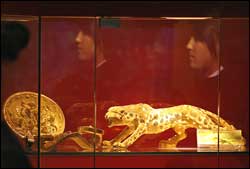
The mainland is seriously considering a plan to diversify more of its massive foreign-exchange reserves into gold, a person familiar with the situation told The Standard.
Beijing is considering changing its asset allocations during the financial tsunami in order to build up gold reserves “in a big way,” the source said.
China’s fears about the long-term viability of parking most of its reserves in US government bonds were triggered by Treasury Secretary Henry Paulson’s US$700 billion (HK$5.46 trillion) bailout plan, which may make the US budget deficit balloon to well over US$1 trillion this fiscal year.
The US government will fund the bailout by printing new money or issuing huge amounts of new debt, either of which will put severe pressure on the value of the greenback and on government bond yields.
The United States holds 8,133.5 tonnes of gold reserves valued at US$188.23 billion. China holds gold reserves of just 600 tonnes, worth only US$13.89 billion.
Beijing’s reserves could easily go up to 3,000 to 4,000 tonnes, Tanrich Futures senior vice president Colleen Chow Yin-shan said.
Until now, the United States has had little choice but to issue massive amounts of debt to fund its deficits, and China has had little choice but to purchase it, as there are not many markets deep enough to absorb the mainland’s US$30 billion to US$40 billion in monthly capital inflows.
Government officials involved in the management of China’s reserves are beginning to see gold as an attractive place to park some of these funds. They see it as a real, tangible asset that will not lose its value over time – in stark contrast to the greenback, which is becoming more disconnected from economic realities as more bills are printed.
“It’s the right time to increase the gold reserves, as the price is about US$710 to US$720 per ounce,” said Wan Guoli, vice secretary general of the China Gold Association.
The International Monetary Fund has made reducing global payment imbalances one of its priorities in the aftermath of the financial tsunami.
“I think China probably will expand its strategic reserves into commodities during this downturn,” said a Hong Kong-based strategist.
“China will continue to buy treasuries … otherwise the system would get distorted,” he said.
“But I think China will diversify its reserves.”
Friday, November 14, 2008
Benjamin Scent
Source: The Standard